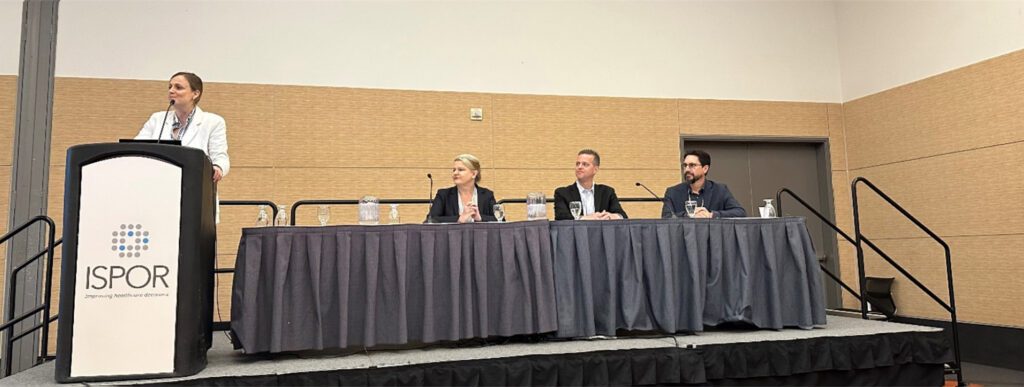IN CASE YOU MISSED IT
Home / Intelligence / Blog / ISPOR 2023 Trinity Panel: Enabling Patient Access to Digital Therapeutics – The Optimal Approach?
Published June 21, 2023
Monica Martin de Bustamante, Sr. Partner of Trinity’s Evidence, Value, Access, and Pricing (EVAP) team, moderated an exciting conversation at ISPOR 2023 Global in Boston earlier this month. Monica spoke with Lisa Marsch, Ph.D., Benjamin Parcher, PharmD, MS, and Fulton Velez, MD, MS, MBA, all experts in the field of Digital Therapeutics (DTx), about the role of evidence development in the approval of DTx to date, and what evidence development requirements could look like in the next five years.

Past and Current Evidence Development
DTx has enabled healthcare systems to deliver best-in-class treatments while extending the reach of physicians, helping address capacity challenges, and enabling appropriate patient care.
Additionally, these technologies have been developed with a user-centric approach through different rounds of iteration to ensure they can have a long-term impact (vs. other pharma alternatives).
DTx often have substantial evidence supporting their value; the emphasis of current studies has been on efficacy and safety through randomized clinical trials with small sizes or evidence of clinical benefit supported by pilot studies at an individual insurer level (pre-post vs. control). However, the first movers in this area have faced challenges in reimbursement. Despite many positive changes, uncertainties about how healthcare systems will support these technologies still need to be resolved.
While there is still a significant opportunity for alternative therapeutic options, for example, the rate of breakthrough designations is higher than with any other modality, significant efforts will be required to increase willingness to pay for these technologies.
To drive the adoption of these products, physicians, healthcare systems, and patients need to become familiar with their use and value. Increased familiarity with the current clinical evidence for DTx and partnerships with payers, larger pharma, and academic centers will be key to driving the growth of these technologies. These partnerships and the broader and deeper real-world evidence will help create a clear understanding of the value of DTx and lead to a higher level of central coordination on the structure for the DTx evaluation.
Current market perspective: DTx is dominated by small biotech companies looking to expand their reach; start-up developers commercialize 27 Prescription Digital Therapeutics (PDTs), while the remaining two are commercialized via Orexo pharmaceuticals.
Future Market
Once these areas of alignment have been reached, the future of evidence development for DTx can be supported. Some key trends expected in the next five years include:
- Use of larger sample sizes, with an emphasis on multi-stakeholder (or multi-state) evidence generation, and enablement of robust subgroup analyses
- Comparative effectiveness vs. other DTx targeting the same disease
- Availability of evidence supporting the long-term durability of clinical and economic impact
- Collection of a broader set of societal benefit endpoints, including impact on population health, mental health, patient journey, prevention of the onset of illness, and health inequities
- Use of additional insights generated by HEOR, data science, and machine learning, and greater integration with wearables
- The evaluation of DTx will be conducted with informed clinicians who have been fully trained on the implementation of the DTx and can evaluate cross-therapeutic area benefit
- Collaboration between like-minded DTx companies to augment the clinical and economic impact, and increased attention from traditional biopharmaceutical companies to boost the effectiveness of their products
For the comfort of different stakeholder groups, the use of DTx is expected to continue to increase, leading to continued expansion, more significant evidence, and broader payer acceptance and willingness to pay. Education, desire to collaborate, risk sharing, and increased awareness of the potential to reduce excess healthcare resource utilization while improving patient and population well-being will be key to ensuring the successful uptake and coverage of DTx.

To know more about this session, please visit ISPOR’s website.
Authors:
Monica Martin de Bustamante, Sr. Partner, Evidence, Value, Access and Pricing (EVAP), Trinity Life Sciences.
Dr. Lisa Marsch, director of the Center for Technology and Behavioral Health and Northeast Node National Drug Abuse Treatment Clinical Trials Network, and Andrew G. Wallace, Professor of Psychiatry and Biomedical Data Science at Dartmouth College.
Dr. Fulton Velez, Principal at New Hope Life Sciences Consulting, an experienced professional in HEOR, market access, medical affairs, and RWE, and former Head of HEOR and Medical Affairs Lead at Pear Therapeutics.
Dr. Benjamin Parcher, Global Market Access Lead, CNS Digital Therapeutics, Boehringer Ingelheim Pharmaceuticals. For more information, please visit Prescription Digital Therapeutics, a New Frontier in Mental Health Care (boehringer-ingelheim.com).
Sonia Acosta Luis, Senior Consultant, Trinity Life Sciences.
Related Intelligence
Blog
Joint Clinical Assessment in the EU: What Life Sciences Companies Need to Know
March 2025 marked a pivotal moment for pharmaceutical and biotech companies operating in the European Union (EU) as the first two molecules began to proceed through the Joint Clinical Assessment (JCA) process. At a recent seminar hosted by Trinity Life Sciences, stakeholders gathered to explore the implications of this new regulatory framework and how to […]
Read More
Blog
Pricing and Access in Germany: Innovation and Strong Evidence Rewarded
Germany’s Medical Research Act (Medizinforschungsgesetz or MFG), which came into force on October 30, 2024, is a major legislative reform aimed at strengthening Germany’s position as an attractive environment for medical innovation and pharmaceutical development. The act provides for confidential negotiated drug pricing, incentives for local clinical trials, simplified clinical trial approvals and harmonization of […]
Read More
Blog
Seizing the Storm: Why Pharma Must Plan, Not Panic in Trump’s Second Term
The first 100 days of President Trump’s return to the White House have been anything but ordinary. With a true “Flood the Zone” strategy, there has been a flurry of executive orders, leadership reshuffles, and a re-assertion of executive power, which has signaled the administration is interested in seeing what policy options can “stick.” While […]
Read More
